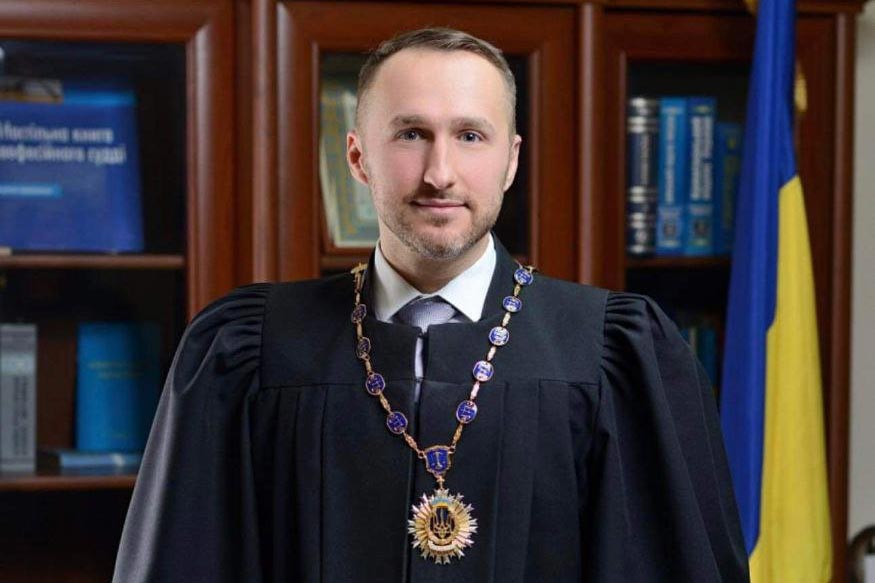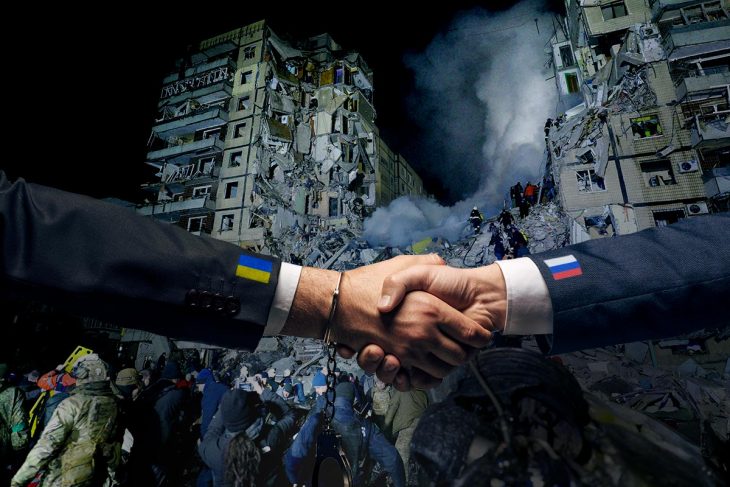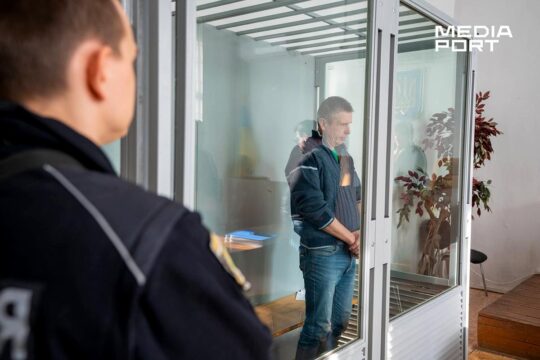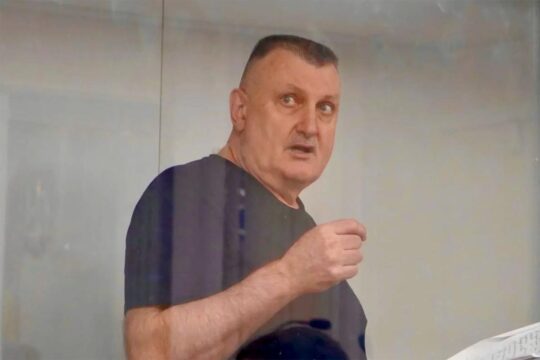Hearings against those accused of collaboration and high treason are held regularly in the courts of the Dnipropetrovsk region, in eastern Ukraine. The Unified Register of Court Decisions shows that by December 26 the number of verdicts under Article 111-1 of the Ukraine Criminal Code for "collaboration" crimes had reached 45. Only five of those verdicts were made publicly available. According to a source in the local courts, the information provided in other verdicts is protected for security reasons. But an analysis of the verdicts reveals how Dnipropetrovsk judges punished individuals for collaboration activities.
In the publicly available September 21, 2022 verdict of the Krasnohvardiyskyi District Court against a resident of Kamyanske, the court states that during the summer of 2022, the officially unemployed defendant decided to record a video about the situation in the country and the city of Dnipro on his cell phone and show it to his followers on the social network Facebook. The man managed to record two videos, and according to the conclusion of an expert from the Ukrainian Scientific Research Institute of Special Equipment and Forensic Expertise of the Security Service of Ukraine, "the speeches on the videos revealed public denial of Russia's armed aggression (war) against Ukraine and public calls for support for Russia's armed aggression (war) against Ukraine, establishment and affirmation of the temporary occupation of part of the territory of Ukraine, public calls for support for decisions and/or actions of the aggressor state, armed formations and/or the occupation administration of the aggressor state, to cooperate with the aggressor state, armed formations and/or the occupation administration of the aggressor state, to not recognize the extension of Ukraine's state sovereignty to the temporarily occupied territory of Ukraine".
In the presence of his defence counsel, the defendant submitted a written statement in which he pleaded guilty and concurred with the circumstances determined by the pre-trial investigation. As a result of the guilty plea, the trial was conducted in a simplified procedure. Upon receipt of the indictment, the court, with the consent of the accused, considers it within five days, without a court hearing. In this case, the court took into account mitigating circumstances, namely the "sincere repentance and active assistance in solving the criminal offence" by the accused. It sentenced him to a 10-year ban from serving in state and local government institutions of Ukraine.
Banned from serving in public institutions
On November 22, 2022, a similar sentence was pronounced by the Novomoskovsk City District Court against a native of Kupyansk, Kharkiv region. In July 2022, the defendant had publicly denied Russia's armed aggression against Ukraine and spoken in favour of establishing the occupiers' control over the city of Kharkiv. The accused, an unemployed woman with a secondary education, was deprived of the right to serve in state and local institutions. The court considered such a punishment to be necessary and sufficient, taking into account the defendant's sincere repentance.
In December 2022, the same court sentenced a native of the village of Prykolote, Velykoburlutskyi district, Kharkiv region. According to the court filings, in June of the same year, in order to assist the enemy state, this other unemployed woman voluntarily agreed to hold a position in the organization of the occupation authorities and was appointed by the order of the acting head of the temporary civil administration of the Kupyansk district of Kharkiv region, as an acting chief specialist of the economic development department created by the administration of the occupying state. She was the one responsible for preparing and issuing payment statements for financial assistance to the local population from the occupation authorities of the Russian Federation. In court, the accused pleaded guilty to committing a criminal offense. She was sentenced to 13 years of prohibition from holding positions in state and local institutions.
"I am for Putin, for peace, for security!"
In the same month, the Industrial District Court of Dnipro deprived a resident of the temporarily occupied village of Novoselivka, in the Donetsk region, of the right to hold positions in local and state authorities for 10 years without forfeiture of property. According to the court decision, the woman voluntarily took the position of "block supervisor" in Yenakiyevo, for which she received a salary from the occupants. The defendant's duties were the following: on the streets assigned to her, she informed the local population about meetings held by representatives of the so-called "DPR" – the self-proclaimed separatist Donetsk People’s Republic –, and drafted lists of local residents who remained in the village. The accused pleaded guilty. The court acknowledged her sincere repentance and active assistance in solving the offence as mitigating circumstances.
The Pavlohrad City District Court also sentenced a retired woman of Russian origin to 10 years of prohibition to hold any position in private sector legal entities. From April to June 2022 she posted statements on Odnoklassniki social network which were addressed to an unspecified number of people. Statements included the following: "22 kilometers to go before the Severodonetsk-Lysychansk group of the Ukrainian armed forces is caught in pincer. Victory to our men and safe return"; "Russians. They are demining the fields, bringing grain and fertilizers to the farmers, helping to carry out the sowing season. The West. Exporting grain from Ukraine. So, who are the occupants here, Gentlemen?"; "I am for Putin, for peace, for security!" The judges qualified her actions as public appeals by a citizen of Ukraine to support the decisions and actions of the aggressor state. At the preliminary hearing, the accused pleaded guilty to the criminal offence and sincerely repented her deeds. She also asked the court to approve the plea agreement concluded between her and the prosecutor. The court found her guilty and the material evidence - the laptop she used to publish the posts - was returned to the elderly woman.
Prison for an informant
Most collaborators' trials end with a plea agreement, which is a common practice to reduce the sentence. And the most severe sentences are pronounced in proceedings where the Security Service of Ukraine (SBU) conducted the pre-trial investigation, as in the following case.
In August 2022, the Petropavlivskyi District Court delivered a verdict in the case of a citizen passing intelligence to the Russian special service. According to the SBU, prior to Russia's invasion, Russian Security Service (FSB) officers had spotted this citizen of Ukraine who was a convict in a penal facility in Russia. Sent as an informant on Ukrainian soil, he was gathering and passing on information on the location of firing positions of Ukraine’s Armed Forces, border guards and the National Guard on the territory of Lysychansk, in eastern Ukraine. The man also allegedly coordinated the enemy's artillery fire on the city of Dnipro. He was receiving a financial reward from the enemy in exchange for this. During his arrest, Ukraine’s SBU seized from him communication devices with voice messages and correspondence that confirmed the commission of the crimes. The court found the man guilty of "providing assistance to the aggressor state in conducting hostilities against the Armed Forces of Ukraine". The man was sentenced to 12 years behind bars.
Access to evidence and to suspects
Dmytro Movchan is a judge of the Leninsky District Court of Dnipro. He spoke to Zlochyn.dp.ua about the trials on charges of collaboration. “It is worth mentioning that there are not many collaborators and traitors in the city of Dnipro. They have either moved away or they stay well hidden. The cases we are examining are mostly related to the temporarily occupied territories. For example, the district court of Dnipro, where I work, has jurisdiction over two districts of Mariupol and one district of the Donetsk region. There are, without a doubt, collaborators there,” he explained. “The pre-trial investigation authority must first identify the collaborators. When it concerns the temporarily occupied territory, it takes time. Mainly because of the presence of the enemy and the ongoing military operations in the area. After identifying the suspects, the prosecution must ensure that the evidence is collected and properly documented” and “meets the criteria of sufficiency, reliability, admissibility and adequacy”. Then there is the issue of finding the suspect, he says. “Most often, a person who is charged is not here, he or she is hiding somewhere in the temporarily occupied territories or has fled to a country whose name I don't even want to pronounce. This adds complications to the consideration of cases of this category.” The accused must then be provided with legal defence, and “must be duly notified. We try to achieve this through all available procedural tools that we have, through publications in the relevant media, official announcements on the websites of the judicial authorities. If the person is duly notified, the court reviews the case and delivers a verdict”.

The judge recalls the effects of drone and missile attacks on the Ukrainian energy system by Russia. “During the blackout and constant missile attacks, Ukrainian courts, which are still not equipped with autonomous energy sources, are practically forced to remain inactive. If technical recording devices, electronic offices, and so on do not work, the whole system “enters a state of stasis. At times, some procedural documents were drafted by hand and under the light of flashlights in the shelters”.
Going after state agents
“I have good reason to believe that the wave of pre-trial investigations is now reaching its completion,” the judge continues. “Most of the cases that have been forwarded to the court are already being heard on the merits. Without a doubt, all agents of the enemy's influence must be neutralized and punished. But when it comes to treason and collaboration, we should not forget about the so-called ‘efficient value’. It is no secret that certain professions require an oath of allegiance to the Ukrainian people. When a person holds a certain public position and is under an oath, he or she may have access to state secrets, information, and means of influence. It is these individuals, who are state traitors, who must be identified first and foremost, and this is very meticulous work. If you take an oath that binds you, and then betray the Ukrainian people, this is one thing. And the other is when you do not take an oath, but while living in this country, for some reason you start campaigning and helping the enemy; this is already a manifestation of collaboration. Both are in fact betrayals of the interests of the state and the nation. The only difference is in the subject matter. The courts of Ukraine -- and the Dnipropetrovsk region is no exception -- are already examining cases of treason involving civil servants, lower-ranking police officers, lawyers, and state executives. Unfortunately, in rare cases, treason is also committed by judges. The state is trying to ensure that such cases are investigated on a priority basis.”
This report is part of our coverage of war crimes justice produced in partnership with Ukrainian journalists. A first version of this article was published on the "Zlochyn.dp.ua" website.






